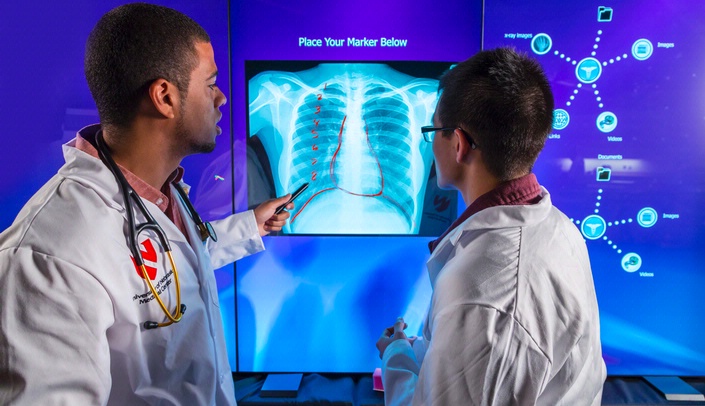This fall, UNMC medical students are learning medicine a new way – the 21st century way and they are learning to think like a physician from the start.
Phase I of Training the Physicians of Tomorrow (TPT) was launched in August for incoming medical students. It is an active learning-based curriculum that emphasizes hands-on learning techniques, small-group interaction, patient-centered care, and a focus on students developing skills in inquiry.
For the past three years, a team of more than 120 College of Medicine faculty members and staff have labored to redesign the curriculum to reflect the learning habits of the device-oriented, online and socially-networked millennial generation. It’s an ongoing challenge.
Kelly Caverzagie, M.D., associate dean for educational strategy, team leader and 2001 alum, has overseen the complex orchestration of design and scheduling efforts across multiple specialties. It was a big task. The structure of the current curriculum, while world-class, had been essentially the same since 1993.
"We have always been focused on providing the best medical education we can, and with changing times came the need for a different approach," he said. "Our goal is to integrate subjects to create a clear picture for the student. Historically, students learned different aspects of an organ system – like cardiovascular – at different points in the curriculum.
"TPT brings the details of each system together so one organ system is taught in its entirety in each block in a way that helps students learn in a manner that reflects how physicians think. It’s a tightly interwoven, integrated learning experience that’s more engaging and meaningful."
Last year, the redesign dovetailed with a national movement to integrate interprofessional education and practice when UNMC was selected as one of 21 medical schools in the U.S. by the American Medical Association to be part of its Accelerating Change in Medical Education Consortium. Through the consortium, UNMC is a leader in creating "the medical school of the future." Dr. Caverzagie is principal investigator for UNMC in the consortium.
For the next 18 months, students will be immersed in a series of 11 blocks that lay the foundation for the practice of medicine and provide the groundwork for the two subsequent phases. The teaching of normal structure and function of each organ system is followed by presentation of abnormalities in that system. The new block design allows students to see interactions between systems in a single educational exposure.
With the purposeful and longitudinal integration of the health systems sciences and the intertwined aspects of medical care through which physicians must interact and understand, students will develop an understanding of key principles – patient safety, quality improvement, health care financing, population management and the social determinants of health. Electronic medical records are used as realistic teaching platforms to prepare students for future success. Emphasis also is placed on physician wellness and developing a professional mindset.
"We’re using active teaching methods that favor large and small group interactions," Dr. Caverzagie said.
Interactive methods include use of the world-class, high tech:
- iEXCELSM (Interprofessional Experiential Center for Enduring Learning) that includes surgical and advanced simulation clinical settings and virtual immersive reality;
- E-Learning modules, developed by faculty and students as specialized interactive learning tools; and
- Human patient simulators.
When the Dr. Edwin Davis & Dorothy Balbach Davis Global Center for Advanced Interprofessional Learning opens next year, the latest technology will engage learners with realistic simulated experiences designed to make learning interactive.
Phase II of the TPT curriculum provides extensive clinical learning experiences in six of the core disciplines of medicine. Over a 12-month period, students will begin to apply the lessons learned from the first phase and formally care for patients in both hospital and ambulatory clinical settings.
Finally, for 13 months in Phase III, students will have the opportunity to explore a variety of disciplines before settling upon a set of focused senior career tracks in their chosen specialties.
Another major change is grading. Students will be assessed as ‘pass/fail’ for the pre-clinical aspects of the curriculum, and then as ‘honors, high pass, pass and fail’ until graduation.
"Pass/fail systems have been shown to foster collaboration over competition," Dr. Caverzagie said.
"We want our students to approach medicine from a team-based perspective to reflect what practicing medicine in a clinical setting is really like."
For third- and fourth-year students, a more traditional grading system allows students to differentiate themselves, or shine, in specific areas of their choosing. "Students have different skills sets and interests and this grading scheme will help them highlight their respective skill set.
"It’s a new era for medical education."
